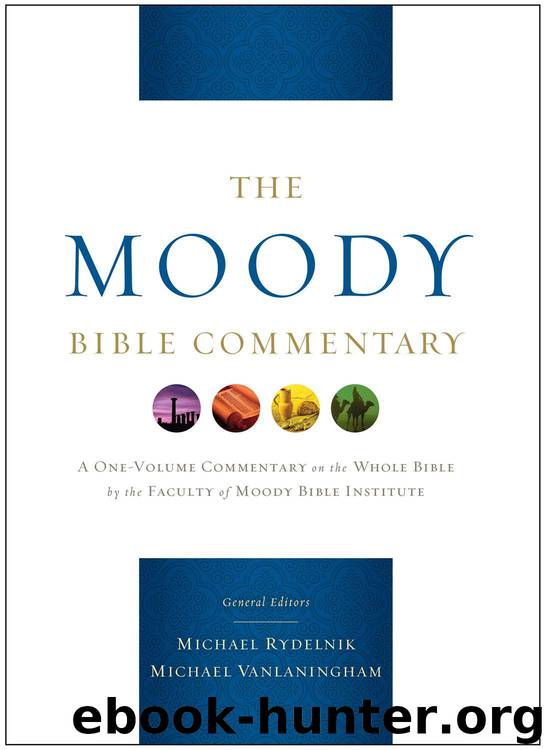The Moody Bible Commentary by Michael Rydelnik & Michael Vanlaningham

Author:Michael Rydelnik & Michael Vanlaningham
Language: eng
Format: mobi, epub
Tags: Pastoral Resources, Christian, Biblical Commentary, Christian Ministry, General, Religion, Preaching, Biblical Reference
ISBN: 9780802490186
Publisher: Moody Publishers
Published: 2014-03-14T22:00:00+00:00
III. The Blessing of Israel and the Nations (36:1–66:24)
The simple structure of Isaiah is a prologue (chaps. 1–6) followed by two main sections (chaps. 7–35 and 36–66). The second of the two main sections of Isaiah starts here (36:1). Each of the two sections begins with narratives containing similar content. In each one, a king from Judah is facing a military threat and Isaiah the prophet brings them each a sign of hope. The primary difference between these two narratives is that in the first narrative (chaps. 7–12), wicked King Ahaz rejects the Lord’s sign, while in the second (chaps. 36–39), good King Hezekiah trusts the Lord’s sign. Both narratives are followed by sections of oracles: after the rejected sign the oracles emphasize judgment (chaps. 13–35), whereas after the accepted sign they emphasize blessing (chaps. 40–66). The next section contains the second narrative of a sign accepted (chaps. 36–39), to be followed by the oracles of blessing (chaps. 40–66).
A. A Narrative of a Sign Accepted: Hezekiah Chooses to Trust the Lord (36:1–39:8)
The stories about the reign of King Hezekiah, including the Assyrian threat, the king’s recovery from deadly illness, and his foolish exhibition of Israel’s wealth to the Babylonians are designed as a parallel to the events in the reign of King Ahaz (see chaps. 7–12), the chief difference being that Hezekiah, unlike Ahaz, is a godly king. Both were offered signs from God but Ahaz refused (7:12), while Hezekiah willingly received signs from the Lord (37:30; 38:7-8).
The content of this part of the book is virtually identical to 2Kg 18:13–20:19, with the exception being that the Isaiah account includes Hezekiah’s prayer of thanksgiving (38:9-20). This whole narrative section is integral to Isaiah’s book. Since the book of Isaiah predated the books of 1 and 2 Kings, this makes it likely that this section of Isaiah was the source of the 2 Kings account.
The events in chaps. 36–37 chronologically follow those in chaps. 38–39. This is plain from 38:6, which anticipates the threat and defeat of the Assyrians (described in chaps. 36–37) as yet future. Moreover, extrabiblical historical records agree, placing Sennacherib’s siege of Judah (recounted in chaps. 36–37) in 701 BC but the visit of Merodach-baladan’s delegation (39:1) in 703 BC.
There were several literary purposes for the non-chronological arrangement of this section of the book. First, the narrative portion functions as a bridge from the previous oracles to the following oracles. Isaiah 36–37, with its emphasis on the Assyrian threat, provides closure to the first part of the book (chaps. 7–35), in which Assyria was prominent. Isaiah 38–39, with its emphasis on the Babylonian visit, anticipates the second part of the book (chaps. 40–66), in which Babylon is prominent.
A second structural purpose for the non-chronological arrangement is so that the historical narrative would end with Hezekiah’s great failure (showing the treasures of the temple to the Babylonian ruler) rather than his greatest act of faith. After reading the first part of the book, a reader might conclude that Hezekiah was the great king anticipated in 7:13-15; 9:6-7; and 11:1-16.
Download
The Moody Bible Commentary by Michael Rydelnik & Michael Vanlaningham.epub
This site does not store any files on its server. We only index and link to content provided by other sites. Please contact the content providers to delete copyright contents if any and email us, we'll remove relevant links or contents immediately.
The Five People You Meet in Heaven by Mitch Albom(3561)
The Secret Power of Speaking God's Word by Joyce Meyer(3178)
Real Sex by Lauren F. Winner(3014)
Name Book, The: Over 10,000 Names--Their Meanings, Origins, and Spiritual Significance by Astoria Dorothy(2978)
The Holy Spirit by Billy Graham(2944)
0041152001443424520 .pdf by Unknown(2843)
How The Mind Works by Steven Pinker(2813)
ESV Study Bible by Crossway(2773)
Ancient Worlds by Michael Scott(2682)
Churchill by Paul Johnson(2578)
The Meaning of the Library by unknow(2564)
The ESV Study Bible by Crossway Bibles(2550)
The Gnostic Gospels by Pagels Elaine(2527)
MOSES THE EGYPTIAN by Jan Assmann(2411)
Jesus by Paul Johnson(2352)
City of Stairs by Robert Jackson Bennett(2347)
The Complete Dead Sea Scrolls in English (7th Edition) (Penguin Classics) by Geza Vermes(2277)
The Nativity by Geza Vermes(2226)
Ancient Near Eastern Thought and the Old Testament by John H. Walton(2223)
